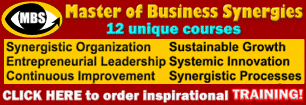|
Be Different and Make a Difference! How To Survive and Win in the Era of Over-Communication and Killer Competition |
|
by Vadim Kotelnikov, Founder, The first-ever BUSINESS e-COACH for Innovative Leaders, 1000ventures.com
"Do not go where the path may lead, go instead where there is no path and leave a trail." - Ralph Waldo Emerson
|
The Need To Be Different No one gets ahead by copying the status quo or imitating competitors. The concept of being unique or different is far more important today than it was ten years ago. In the emerging era of over-communication and hyper-competition, people are overwhelmed by choice - choice of information, ideas, products, and services. In this sea of choice, most customers have trouble making choices about buying decisions. Choosing among multiple options is always based on differences, implicit or explicit. New Realities and New Survival Strategies In today's tidal wave of global economic, technological, and social change, that name of the game for you and your organization is survival. You are not going to survive in this new economy through technology innovation alone. If you are going to withstand relentless and constantly growing global competition, you need to be different and radically change the way of doing business. You have to give up the old hierarchical, adversarial approach which wastes individual talents and saps energy in unproductive conflict. Instead you need to create a new management model, switch from management to leadership, manage change, build trust, drive out fear of failure and and create productive partnerships in which everyone can offer their unique knowledge and talents. If you know how to help your organization to do this, you can make a decisive difference.6 Find the Difference that Makes the Difference If two situations or processes seem very similar but have different outcomes, it is important to look for any differences between them, and then to find out which of those differences is the key to the different outcome. You can use feedback and contrastive analysis for the purpose. Contrastive analysis is the tool that helps you to find out what differences make the difference and, thus, tells you where you need to take action. In contrastive analysis, you are contrasting similarities and differences between one situation and another to find the difference that is significant. Ask Effective Questions Creativity requires an inquisitive mind. "Fresh, creative thoughts don't grow in the dry soil of mindless acceptance. Yet it is easy to go through your day without calling anything important into question."8 Effective learning questions can serve as a starting point for the assimilation of learning. Ask "why?" and "what if?" questions and develop "what-if" scenarios to discover new opportunities around you...More Coach Yourself Consider these points:
Avoid the Logical Trap Don't let assumptions stifle your capacity. In our desire to think logically, we tend to organize everything into little compartments and keep it there. One word is all it takes to give you access to one of your compartments. Try it. What the word "vacation" brings up in your mind (travel, beach, sightseeing?) and what not (violin?)? But if you spent a vacation learning to play the violin, it would be in that compartment. "The logical structure of our compartments is so important that we tend to avoid something that is at variance with them. We want things to be orderly and 'right'. So when something intrudes into our logical patterns, we become uncomfortable - our comfort zone has been penetrated. We resist strange-seeming change. We expect things to happen logically, so we can anticipate the results of action. If they don't happen logically, unexpected results can occur, and we can feel unhappy. So we avoid the unexpected by staying with the comfortable."7 You must start thinking differently to avoid this barrier to generating great ideas that may seem illogical. You need to recognize this barrier and challenge yourself to act sometimes differently, illogically to avoid the logical trap. Creativity - Your Key To the Future Creativity is your key to the future. All progress comes about as the result of finding better, faster, cheaper, easier or different ways to do things and this requires the continual honing of your creative thinking skills6...More Lateral Thinking Lateral thinking is concerned with generation of new ideas. It is also concerned with "breaking out of the concept prisons of old ideas."2...More Case in Point: Dell Computer Corporation "It is really dangerous if everyone in a company starts thinking the same way", says Michael Dell5, Chairman and CEO of the Dell Computer Corporation. "The danger comes when you fall into the trap of approaching problems too similarly. You can encourage your people to think about your business, your industry, your customers innovatively. Ask a different question - or word the same question in a different way. By approaching a problem, a response or an opportunity from a different perspective, you create an opportunity for new understanding and new learning. By questioning all the aspects of our business, we continuously inject improvement and innovation into our culture."...More Case in Point: 25 Lessons from Jack Welch "Look for the quantum leap," advised Jack Welch, the legendary former CEO of GE. Make surprise moves - shock your rivals. Shake things up while other look on from the sidelines, sitting idly by while you knock your competitors for a loop. The three critical ingredients of the quantum leap are surprise, boldness, and shock...More
|
Bibliography:
-
"Differentiate or Die", Jack Trout with Steve Rivkin, 2000
-
"Lateral Thinking", Edward de Bono, 1970
-
"Get Smart!", Management Success Newsletter by Brian Tracy
, November 2003
-
"1001 Ways to Take Initiative", Bob Nelson, 1999
-
"Direct from Dell", Michael Dell with Catherine Fredman, 1999
-
"Making a Difference", Bruce Nixon, 2001
-
"101 Ways To Generate Great Ideas", Timothy R.V. Foster, 2001
-
"Creativity", Alexander Hiam, 2002



